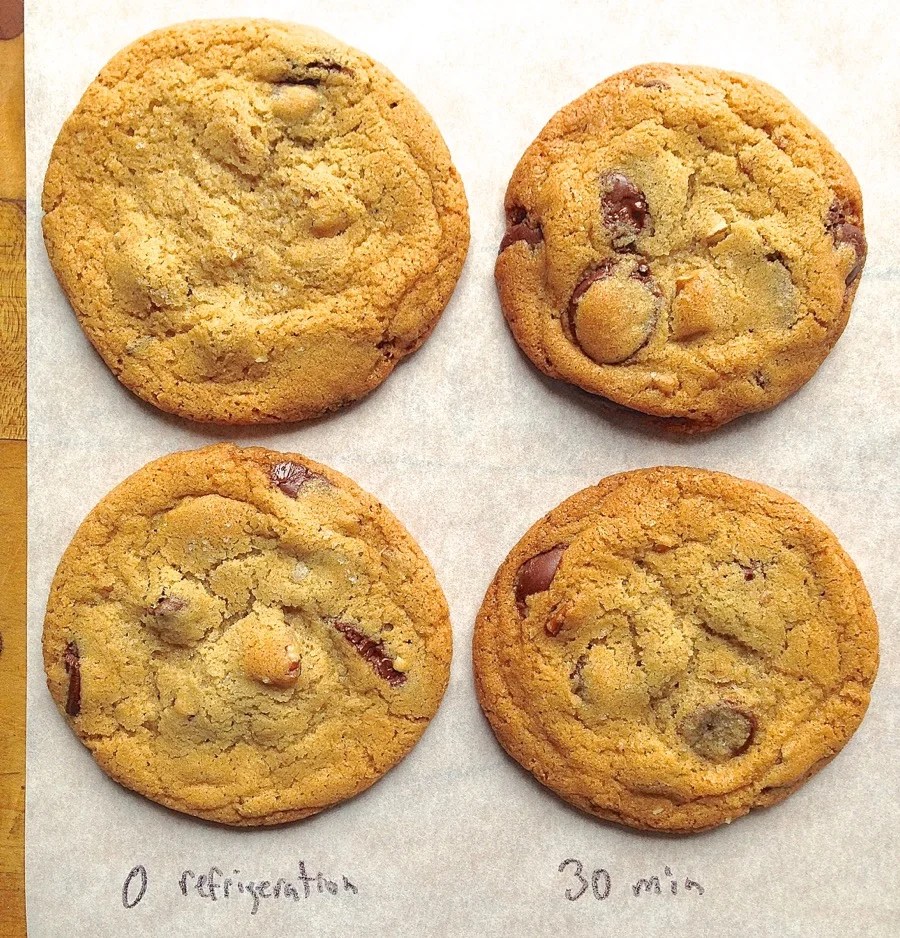Why refrigerate chocolate chip cookie dough — or for that matter, any basic drop cookie dough — before baking? Does chilling cookie dough really make any difference?
The short answer: yes, chilling cookie dough prior to baking does make a difference. But the story behind that yes might surprise you.

We recently tested this question with a batch of chocolate chip cookie dough . Understand, though, that these results can be applied to other kinds of plain drop cookie dough: sugar cookies , snickerdoodles , etc.
Pillsbury Refrigerated Ready To Bake! Chocolate Chip Cookie Dough 24 Count
Then, we put the dough in the fridge and continued to bake cookies over the next 10 days, at regularly spaced intervals after aging.
The cookies pictured above are the same size, weight-wise. But look at the difference in spread — the cookie dough that was refrigerated spread less. The cookie dough without refrigeration also browned less.
Call it the law of diminishing returns. The major difference is between no chilling at all vs. chilling cookie dough for 30 minutes. After that, the baked cookie continues to evolve — though very gradually.
How To Cook Refrigerated Cookie Dough In Air Fryer
Here you see the beginning and end of the test: Clearly the cookie baked from dough aged for 10 days in the refrigerator spread less and is darker in color. Its flavor is also more pronounced; our taste testers couldn't identify any particular flavor note that stood out above the rest, but simply noted that the cookie aged for 10 days tastes better than the cookie baked on day #1.
Overall, cookies baked immediately tasted rather flat; and their texture was soft and rather doughy, without being chewy. Cookies baked after chilling the dough (for as little as 30 minutes) became chewy, and progressively more flavorful with longer aging.

Chilling cookie dough before baking solidifies the fat in the cookies. As the cookies bake, the fat in the chilled cookie dough takes longer to melt than room-temperature fat. And the longer the fat remains solid, the less cookies spread.
Why Chill Cookie Dough?
In addition, the sugar in the dough gradually absorbs liquid. If you bake the dough immediately, before sugar has a chance to absorb much liquid, that liquid remains free in the dough, and promotes spread. Think of this in terms of thin vs. thick pancake batter: the more liquid in batter, the more it spreads, right? Same with cookies.
As the dough chills, it gradually dries out, concentrating the flavors of all the ingredients. Think of watered-down lemonade, vs. lemonade with less water: dull flavor vs. bright, tangy flavor. Same with cookies.
Something else happens as the dough rests: part of the flour breaks down into its component parts, including a simple carbohydrate, sugar. Thus, since sugar is a flavor enhancer (like salt), the cookies may taste more flavorful, as well as sweeter after aging.
Should You Cool Cookie Dough Before Baking It? This Video Explains Why
Again, it's not really the chilling, but the dough gradually drying out, that's responsible for texture change. The drier the dough, the more concentrated the sugar. And a higher percentage of sugar creates cookies with chewy/crisp (rather than soft/doughy) texture.
So, enough with the science; let's enjoy one of these fresh-baked chocolate chip cookies, shall we? At the end of the day — or even after just 30 minutes — there's simply nothing finer.

PJ Hamel grew up in New England, graduated from Brown University, and was an award-winning Maine journalist (favorite topics: sports and food) before joining King Arthur Flour in 1990. Hired to write the newly launched Baker’s Catalogue, PJ became the small but growing company’s sixth employee. ...
Why Chilled Cookie Dough Is Better
Things bakers know: The go-to trick for perfectly round logs of cookie dough All you need is parchment paper and a bench knife.
In addition, the sugar in the dough gradually absorbs liquid. If you bake the dough immediately, before sugar has a chance to absorb much liquid, that liquid remains free in the dough, and promotes spread. Think of this in terms of thin vs. thick pancake batter: the more liquid in batter, the more it spreads, right? Same with cookies.
As the dough chills, it gradually dries out, concentrating the flavors of all the ingredients. Think of watered-down lemonade, vs. lemonade with less water: dull flavor vs. bright, tangy flavor. Same with cookies.
Something else happens as the dough rests: part of the flour breaks down into its component parts, including a simple carbohydrate, sugar. Thus, since sugar is a flavor enhancer (like salt), the cookies may taste more flavorful, as well as sweeter after aging.
Should You Cool Cookie Dough Before Baking It? This Video Explains Why
Again, it's not really the chilling, but the dough gradually drying out, that's responsible for texture change. The drier the dough, the more concentrated the sugar. And a higher percentage of sugar creates cookies with chewy/crisp (rather than soft/doughy) texture.
So, enough with the science; let's enjoy one of these fresh-baked chocolate chip cookies, shall we? At the end of the day — or even after just 30 minutes — there's simply nothing finer.

PJ Hamel grew up in New England, graduated from Brown University, and was an award-winning Maine journalist (favorite topics: sports and food) before joining King Arthur Flour in 1990. Hired to write the newly launched Baker’s Catalogue, PJ became the small but growing company’s sixth employee. ...
Why Chilled Cookie Dough Is Better
Things bakers know: The go-to trick for perfectly round logs of cookie dough All you need is parchment paper and a bench knife.

Posting Komentar untuk "How Long To Bake Chilled Cookie Dough"